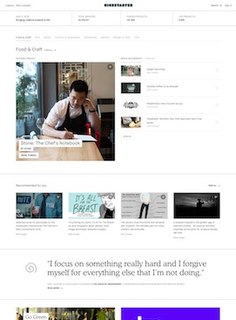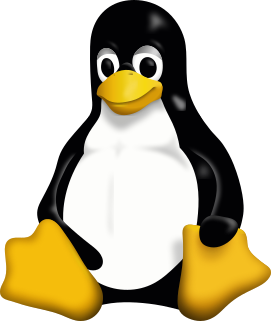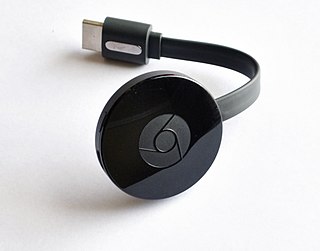OpenFlint is an open technology used for displaying ("casting") content from one computerized device on the display of another. [1] Usually this would be from a smaller personal device (like a smartphone) to a device with a larger screen suitable for viewing by multiple spectators (like a TV).

Smartphones are a class of mobile phones and of multi-purpose mobile computing devices. They are distinguished from feature phones by their stronger hardware capabilities and extensive mobile operating systems, which facilitate wider software, internet, and multimedia functionality, alongside core phone functions such as voice calls and text messaging. Smartphones typically include various sensors that can be leveraged by their software, such as a magnetometer, proximity sensors, barometer, gyroscope and accelerometer, and support wireless communications protocols such as Bluetooth, Wi-Fi, and satellite navigation.
Contents
Development of OpenFlint was initiated in 2014 by the Matchstick project, which is a crowd-funded effort to create a miniature piece of hardware suitable for running an OpenFlint server casting to a screen through an HDMI connection. This is similar in concept to Google's Chromecast device that uses Google Cast.
Matchstick TV was a project started on Kickstarter in September 2014 with the tag line "The Streaming Stick Built on Firefox OS". It was described as an "Open hardware and software platform" device built on Firefox OS and OpenFlint. The Matchstick was to work similar to the Chromecast, so the user can "fling" content from a smartphone to a Wi-Fi connected Matchstick to show the content on a TV.
Crowdfunding is the practice of funding a project or venture by raising small amounts of money from a large number of people, typically via the Internet. Crowdfunding is a form of crowdsourcing and alternative finance. In 2015, over US$34 billion was raised worldwide by crowdfunding.

HDMI is a proprietary audio/video interface for transmitting uncompressed video data and compressed or uncompressed digital audio data from an HDMI-compliant source device, such as a display controller, to a compatible computer monitor, video projector, digital television, or digital audio device. HDMI is a digital replacement for analog video standards.
The Matchstick TV devices are powered by Firefox OS, but as an open technology OpenFlint itself is not tied to any specific operating system or hardware.

Firefox OS is a discontinued open-source operating system – made for smartphones, tablet computers and smart TVs – designed by Mozilla and external contributors. It is based on the rendering engine of the Firefox web browser, Gecko, and on the Linux kernel. It was first commercially released in 2013.
As of July 2015 [update] , no consumer-grade OpenFlint-enabled products have shipped, but Matchstick developer devices have been shipping since late 2014, and the first round of devices for backers of the Matchstick Kickstarter project were expected to ship in February 2015, but were delayed until August 2015. [2]

Kickstarter is an American public-benefit corporation based in Brooklyn, New York, that maintains a global crowdfunding platform focused on creativity and merchandising. The company's stated mission is to "help bring creative projects to life". Kickstarter has reportedly received more than $4 billion in pledges from 15.5 million backers to fund 257,000 creative projects, such as films, music, stage shows, comics, journalism, video games, technology and food-related projects.
A demonstration OpenFlint server can be set up on an ordinary laptop or desktop computer running Linux by following instructions. [3]

Linux is a family of free and open-source software operating systems based on the Linux kernel, an operating system kernel first released on September 17, 1991 by Linus Torvalds. Linux is typically packaged in a Linux distribution.
The Matchstick TV dongle project was canceled due to issues implementing DRM into Firefox OS. [4]







